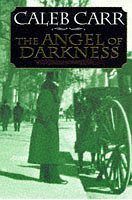Helpful Score: 2
Enjoyable though Looooong (over 700 pages) story of historical crime fighting in late 1800's NYC. Team led by a psychologist (alienist) works to solve a kidnapping that soon leads them to the discovery that a serial killer of children is on the loose. An interesting look at how psychology was viewed by law enforcement, the courts, etc in the early days of the science. Introduces "forensics" as a way to help solve crime, though the courts did not consider it to prove "beyond reasonable doubt".
Though it bogged down in the middle, the last 3rd of the story had me reading faster to see if justice would be served.
Though it bogged down in the middle, the last 3rd of the story had me reading faster to see if justice would be served.
Helpful Score: 1
With The Alienist, I was hooked on the story simply by reading the plot summary on the back of the book. With Angel of Darkness, I wondered how exciting a kidnapping could really be. Don't be fooled like I was, this book is amazing.
While the killer's identity in the Alienist wasn't revealed until the final pages of the book, Angel's killer Libby Hatch is identified in the very first pages. Again, don't be fooled. The 700 pages between identity and conclusion are filled with Carr's amazing grasp of late 19th century New York in addition to all of the crime, court room drama, suspense, forensics, and brainy detective work that was so well done in Alienist.
In some ways I found this book to be even more unsettling, more quietly frightening, and more emotionally draining than the Alienist. The nature of the crimes alone are enough to make you uneasy. Libby Hatch was the embodiment of unpredictable evil hidden in plain sight, playing off society's unrealistic expectations of what it meant in those days to be a woman and a mother. In a sense, I found her to be a more frightening foe than the Alienist's killer.
If you enjoyed the Alienist, I would expect that you would enjoy Angel as well. I found it to be a very worthy sequel, a fantastic read, and well worth my time.
While the killer's identity in the Alienist wasn't revealed until the final pages of the book, Angel's killer Libby Hatch is identified in the very first pages. Again, don't be fooled. The 700 pages between identity and conclusion are filled with Carr's amazing grasp of late 19th century New York in addition to all of the crime, court room drama, suspense, forensics, and brainy detective work that was so well done in Alienist.
In some ways I found this book to be even more unsettling, more quietly frightening, and more emotionally draining than the Alienist. The nature of the crimes alone are enough to make you uneasy. Libby Hatch was the embodiment of unpredictable evil hidden in plain sight, playing off society's unrealistic expectations of what it meant in those days to be a woman and a mother. In a sense, I found her to be a more frightening foe than the Alienist's killer.
If you enjoyed the Alienist, I would expect that you would enjoy Angel as well. I found it to be a very worthy sequel, a fantastic read, and well worth my time.




